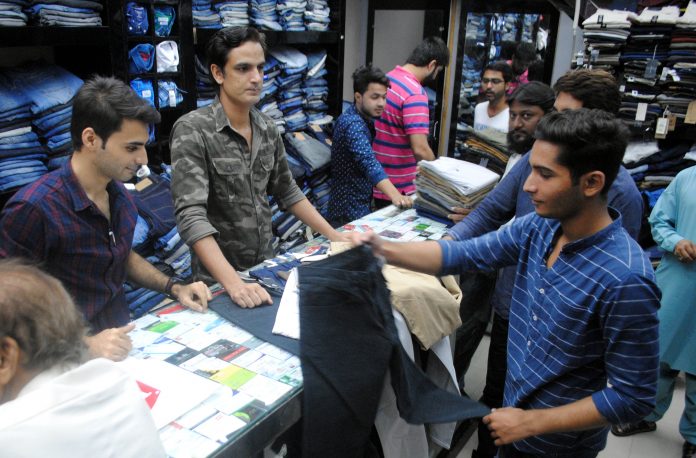After attending his classes at the Karachi University, Adnan Khan occasionally navigates towards Zainab Market, ignoring several glitzier shopping malls along the way. On offer at Zainab’s is quality clothing, of exportable class, at prices that are only a fraction of trendier markets.
Though hipper shopping malls are quite the rage in this metropolis, still Zainab not only has retained its dedicated patrons, it has probably increased its clientele owing to its unique selling point – export quality garments with highly competitive price tags.
The stuff is good, and the prices are downscale because the Market thrives on having on its shelves clothing that is either leftover stock or rejects with minor or negligible flaws.
Set up in the 1970s, the neighbourhood is known as Zainab Market, but there is actually more to it. The area has expanded to 10 sprawling shopping malls and arcades – Madina, Victoria, International, Atrium Mall, Madina City, Rex and Panorama – with as many as 6,000 shops and vendors in all, employing upwards of 10,000 salespeople.

“With regard to offering export quality garments in an affordable price range from the upper middle to the lower income strata, Zainab is one of the largest in Asia,” says Abdul Samad Khan, senior vice-president of the Sadder Alliance of Market Associations.
Popular with retailers from abroad too
Not just the locals, but retailers from Iran, Nigeria and Dubai come here for bulk buying, with the Iranian buyers further exporting the garments procured here to Russia.
People from every part of the city, particularly Nazimabad, North Karachi, Korangi, Gulshan-e-Iqbal, come here to shop.
There is more to it than garments alone. For the foreigners, the place has handicrafts and other knick-knacks on offer, like Sindhi embroidery, marble pieces and other handmade stuff, for taking back home as souvenirs.

The university student who frequents the Market, Adnan, maintains that clothing is export-reject quality, with minor flaws. The shop owners, however, maintain that it is not always the case, but leftover stock as well, “since companies produce in excess to the actual order to meet unanticipated shortfall or to make up in case there are too many rejects.”
Since the foreign importers are some of the biggest brands in business – like Mango, H&M, Old Navy, Next or Zara, to name a few – they are quite fastidious in inspecting the stuff because even a little mark or stitching flaw could do harm their image. So, the producer has to stay prepared to replace that flawed piece. And such flaws do happen once too often. The clothing manufacturers do not make any profit on the excess stock; they just offload the stockpile to free space for the next order, says Mateen Ahmed, for last the 20 years a wholesaler of the leftover export quality garments.
Hence, the availability of slightly-below-perfect brand-quality clothing at throwaway prices.
Selling the surplus at such prices, the manufacturers still don’t lose anything, for the cost is already incorporated in the original order.

Mateen and others in the retail rag trade have contacts in the factories, and once they have stock they would call these vendors over to pick it up. “The leftover for double or triple extra large sizes is a headache for manufacturers because such clothing doesn’t fit Pakistanis.”
In the USA, the size range goes up from XL1 to XL7, with supermarkets like Walmart having dedicated space, or even separate stores stocking only clothes and accessories for the tall and heavy, says Mateen.
The European sizes are more compatible to ours, though.
Not exclusive to middle class
Zainab also attracts the affluent as for both genders it has on its shelves well-designed, in-vogue western stuff – jeans, shirts and T-shirts, leather jackets, sleepwear, skirts etc. – that high-income strata crave for.
“The brand-conscious make a beeline towards Zainab, for they are more aware of the quality and what it would actually cost; they dish out the price without much reluctance,” says a retailer, Mehmood Lakhani.
Mostly through internet browsing, Adnan remains updated with new fashion and brands. Yet he does not inquire about any specific brand, but looks for clothing that he wants. “When you name a brand, the price goes up instantly. So, when I find what I’m looking for, I bargain as if I’m buying just another piece of clothing.”

The Pakistani denim and fleece are quite in demand abroad. But amongst the Pakistanis, awareness about the availability of export-quality clothing has come about in the last 10 years or thereabouts, says Abdul Samad.
Local businessmen also import leftover garment from Bangladesh and China. Bangladesh’s kids’ clothing is in demand in Pakistan, says Abdul Samad.
Media has played a major role in this regard; a decade and a half ago the Pakistanis would not know about western fashion trends in real time – the time lag being 3 to 5 years then.
Now through media and because of internet people know about new clothing styles and they head towards Zainab in search of that, says Samad.
Big brands – Nike, Outfitters, Zara, Levi’s and others have also opened outlets at Atrium Mall; so the brand lovers know not just the products but the difference in prices.

“I go to outlets at Atrium Mall as I always find some sale discounts there,” says Ahmer Javed, a frequent visitor of Zainab.
But the charm of Zainab is the availability of high quality on the cheap, and this is likely to sustain.

























The Zainab Market construction was under the finishing stage till late 1984! Surprised to note your article mentions the market was set up in 1970’s!!